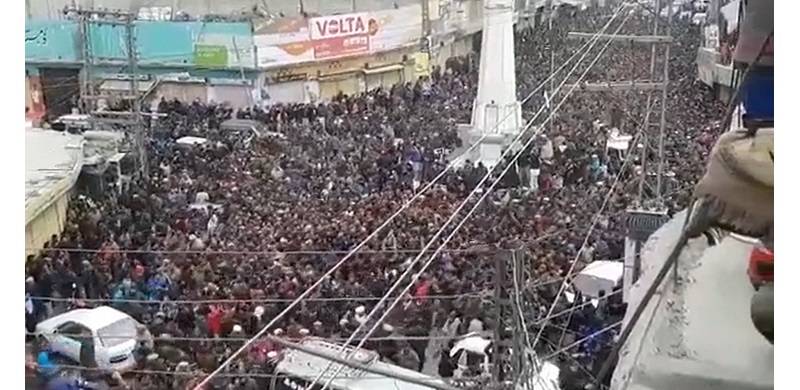
The people of Gilgit-Baltistan have taken to the street in large numbers in freezing cold to demand for their basic rights.
The protest is ongoing reportedly for the past eight days against land grabbing, taxation, frequent power cuts, and reduction in subsidised wheat provided by the centre.
The demonstration have brought the people of the valley together despite the geographic and religious diversities.
Those who are part of the ongoing protests include supporters of political parties as well as trade bodies.
The agitation can be likened with other protests in the country with the aim to demand basic rights. But the aforesaid is different in its plight with regard to its constitutional status and a lack of infrastructure.
The protesters are demanding repealing of the Revenue Authority Bill passed by the region’s assembly last year.
According to them, it would result in more taxes on the region, that too, in the absence of representation in the federation.
They further detest the taking of their land by the state that they say belongs to them, for the CPEC and other projects.
https://twitter.com/steve_hanke/status/1611491424435900418
The fact of the matter is that the state will need to evolve a serious response to the plight of the locals. It must engage them in constructive talk and pay heed to their demands to be able to resolve them.
If the state considers taking of the land necessary, it must take the people of Gilgit into confidence.
According to a report, the region has become a famous tourist destination for both national and international tourists due to the majesty of its innumerable natural features – mountains, forts, deserts, waterfalls, national parks and lakes. According to the government, more than 2 million people visited the valley in the previous year.
The Government of GB should keep in mind the significance of this region, when formulating and planning projects or initiatives. Furthermore, without consulting all stakeholders in Gilgit Baltistan – politicians, religious leaders, civil society, business people and ordinary citizens alike, projects and initiatives cannot be successfully implemented, whether the project in question is the ban on plastic or power generation agreements with European firms.
The protest is ongoing reportedly for the past eight days against land grabbing, taxation, frequent power cuts, and reduction in subsidised wheat provided by the centre.
The demonstration have brought the people of the valley together despite the geographic and religious diversities.
Those who are part of the ongoing protests include supporters of political parties as well as trade bodies.
The agitation can be likened with other protests in the country with the aim to demand basic rights. But the aforesaid is different in its plight with regard to its constitutional status and a lack of infrastructure.
The protesters are demanding repealing of the Revenue Authority Bill passed by the region’s assembly last year.
According to them, it would result in more taxes on the region, that too, in the absence of representation in the federation.
They further detest the taking of their land by the state that they say belongs to them, for the CPEC and other projects.
https://twitter.com/steve_hanke/status/1611491424435900418
The fact of the matter is that the state will need to evolve a serious response to the plight of the locals. It must engage them in constructive talk and pay heed to their demands to be able to resolve them.
If the state considers taking of the land necessary, it must take the people of Gilgit into confidence.
According to a report, the region has become a famous tourist destination for both national and international tourists due to the majesty of its innumerable natural features – mountains, forts, deserts, waterfalls, national parks and lakes. According to the government, more than 2 million people visited the valley in the previous year.
The Government of GB should keep in mind the significance of this region, when formulating and planning projects or initiatives. Furthermore, without consulting all stakeholders in Gilgit Baltistan – politicians, religious leaders, civil society, business people and ordinary citizens alike, projects and initiatives cannot be successfully implemented, whether the project in question is the ban on plastic or power generation agreements with European firms.

